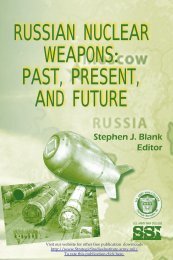The United States and China in Power Transition - Strategic Studies ...
The United States and China in Power Transition - Strategic Studies ...
The United States and China in Power Transition - Strategic Studies ...
You also want an ePaper? Increase the reach of your titles
YUMPU automatically turns print PDFs into web optimized ePapers that Google loves.
threat” quickly became synonymic buzzwords <strong>in</strong> the<br />
U.S. media, academic, <strong>and</strong> policy circles.<br />
Mearsheimer’s work came just <strong>in</strong> time to support<br />
Bernste<strong>in</strong> <strong>and</strong> Munro’s views by provid<strong>in</strong>g a theoretical<br />
explanation as to why <strong>Ch<strong>in</strong>a</strong> would be expected to<br />
do the above-mentioned acts. <strong>The</strong> basic character of<br />
the <strong>in</strong>ternational system dictates that great powers behave<br />
the way they do. In <strong>in</strong>ternational politics, the first<br />
requirement for a state is survival. In an <strong>in</strong>ternational<br />
system where states operate under anarchy (without a<br />
higher authority above them) <strong>and</strong> each possesses offensive<br />
capability <strong>and</strong> holds unpredictable <strong>in</strong>tentions,<br />
a state’s best bet for survival is to maximize its national<br />
power. Great powers by nature have a higher order<br />
of needs. <strong>The</strong>ir need for survival is not merely to be<br />
more powerful than their neighbor next door. <strong>The</strong>re<br />
is a natural tendency for them to strive to be the most<br />
powerful nation <strong>in</strong> their own regions. <strong>The</strong> quest for<br />
power has no end. Regional hegemons will naturally<br />
aim for global hegemony. No regional hegemon likes<br />
to see rival great powers dom<strong>in</strong>ate other regions, or<br />
to have peers. <strong>The</strong> drive for global hegemony necessitates<br />
a competition among the great powers. <strong>The</strong> most<br />
common way for them to w<strong>in</strong> is to <strong>in</strong>crease their own<br />
power base on the one h<strong>and</strong>, <strong>and</strong> to do everyth<strong>in</strong>g<br />
possible to prevent or underm<strong>in</strong>e the development of<br />
other regional hegemons on the other. 42<br />
Follow<strong>in</strong>g this logic, Mearsheimer argued that an<br />
<strong>in</strong>creas<strong>in</strong>gly powerful <strong>Ch<strong>in</strong>a</strong> would try to dom<strong>in</strong>ate<br />
Asia <strong>in</strong> much the same way the <strong>United</strong> <strong>States</strong> did <strong>in</strong><br />
the Western Hemisphere, <strong>and</strong> <strong>Ch<strong>in</strong>a</strong>’s next move must<br />
be to push the <strong>United</strong> <strong>States</strong> out of Asia. Mearsheimer<br />
would not blame <strong>Ch<strong>in</strong>a</strong> for hav<strong>in</strong>g its own version of<br />
the Monroe Doctr<strong>in</strong>e directed at the <strong>United</strong> <strong>States</strong>—<br />
that is what hegemonic powers do to each other. Indeed,<br />
as Bernste<strong>in</strong> <strong>and</strong> Munro put it,<br />
55

















